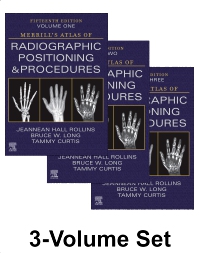
Merrill's Atlas of Radiographic Positioning and Procedures - 3-Volume Set, 15th Edition
Hardcover

Help your students learn positioning skills with the leading radiography text and clinical reference! Merrill's Atlas of Radiographic Positioning & Procedures, 15th Edition describes how to position patients properly, set exposures, and produce the clear radiographs needed to make accurate diagnoses. Guidelines to both common and uncommon projections prepare students for every kind of patient encounter. Anatomy and positioning information is organized by bone group or organ system, and coverage of special imaging modalities includes CT, MRI, sonography, radiation therapy, and more. The gold standard in imaging, Merrill's Atlas covers all procedures in the ASRT radiography curriculum and also prepares students for the ARRT exam!
Newer Edition Available
Merrill's Atlas of Radiographic Positioning and Procedures - 3-Volume Set
-
- NEW! Updated content reflects the advances and continuing evolution of digital imaging technology.
- NEW! Revised positioning techniques reflect the latest American Society of Radiologic Technologists (ASRT) standards, and include photos of current digital imaging for the lower limb, scoliosis, pain management, and the swallowing dysfunction.
- NEW! Added digital radiographs provide greater contrast resolution for improved visualization of pertinent anatomy.
- Comprehensive, full-color coverage of anatomy and positioning makes Merrill's Atlas the most in-depth text and reference available for radiography students and practitioners.
- Guidelines to each projection include a photograph of a properly positioned patient and information on patient position, part position, central ray angulation, collimation, KVp values, and evaluation criteria.
- Diagnostic-quality radiograph for each projection demonstrates the result the radiographer is trying to achieve.
- Coverage of common and unique positioning procedures includes chapters on trauma, surgical radiography, geriatrics/pediatrics, and bone densitometry, to help prepare students for the full scope of situations they will encounter.
- Numerous CT and MRI images enhance comprehension of cross-sectional anatomy and help in preparing for the Registry examination.
- Frequently requested projections are identified with a special icon to help students focus on what they will need to know as an entry-level radiographer.
- Image receptor and collimation sizes plus other key information are provided for each relevant projection.
- Bulleted lists provide clear instructions on how to correctly position the patient and body part when performing procedures.
- Summary tables provide quick access to projection overviews, guides to anatomy, pathology tables for bone groups and body systems, and exposure technique charts.
-
- NEW! Updated content reflects the advances and continuing evolution of digital imaging technology.
- NEW! Revised positioning techniques reflect the latest American Society of Radiologic Technologists (ASRT) standards, and include photos of current digital imaging for the lower limb, scoliosis, pain management, and the swallowing dysfunction.
- NEW! Added digital radiographs provide greater contrast resolution for improved visualization of pertinent anatomy.
-
Chapter 1 – Preliminary Steps in Radiography
Chapter 2 –General Anatomy and Radiographic Positioning Terminology General Anatomy and Radiographic Positioning Terminology
Chapter 3- Thoracic Viscera: Chest and Upper Airway
Chapter 4 – Abdomen
Chapter 5 – Upper Limb
Chapter 6 – Shoulder Girdle
Chapter 7 – Lower Limb
Chapter 8 – Pelvis and Hip
Chapter 9 – Vertebral Column
Chapter 10 – Bony Thorax
Chapter 11 –Skull, Facial Bones, and Paranasal Sinuses
Chapter 12 – Trauma Radiography
Chapter 13-Contrast Arthrography
Chapter 14 – Myelography and other Central Nervous System Imaging
Chapter 15 – Digestive System: Salivary Glands, Alimentary Canal and Biliary System
Chapter 16 - Urinary System and Venipuncture
Chapter 17 – Reproductive System
Chapter 18 – Mammography
Chapter 19 – Bone Densitometry
Chapter 20- Mobile Radiography
Chapter 21 – Surgical Radiography
Chapter 22 – Pediatrics Imaging
Chapter 23 – Geriatric Radiography
Chapter 24 – Sectional Anatomy for Radiographers
Chapter 25 – Computed Tomography
Chapter 26 – Magnetic Resonance Imaging
Chapter 27 – Vascular, Cardiac, and Interventional Radiography
Chapter 28 – Diagnostic Medical Sonography
Chapter 29 – Nuclear Medicine and Molecular Imaging
Chapter 30 – Radiation Oncology






